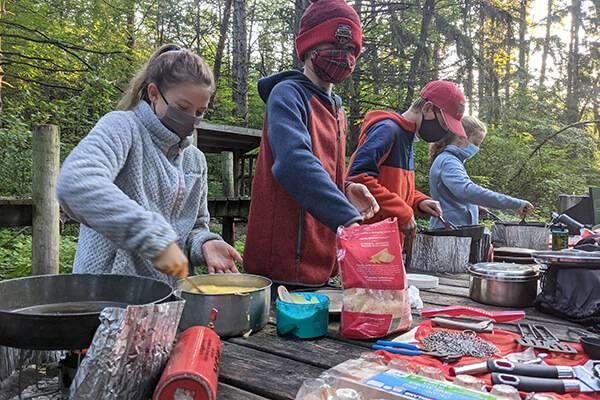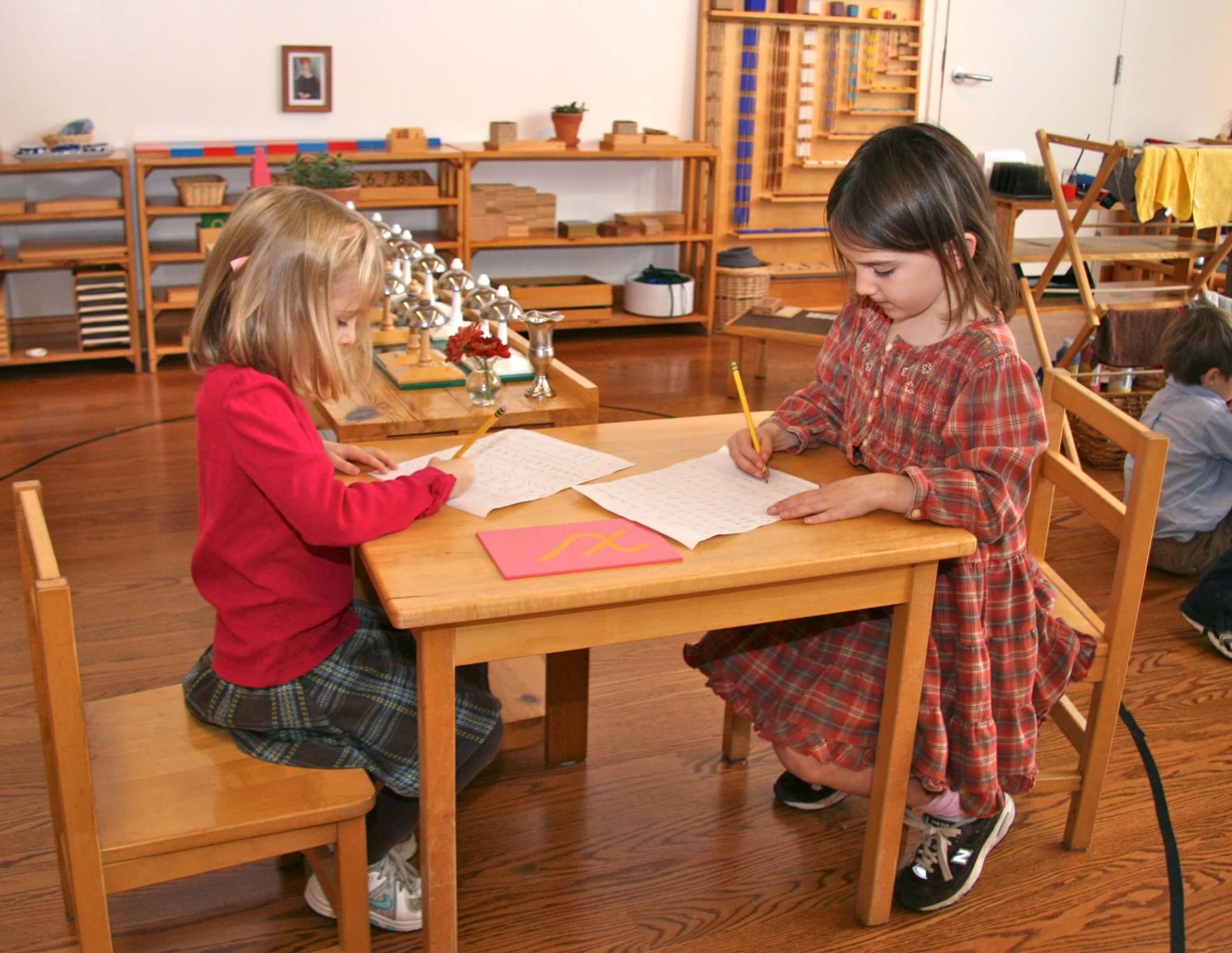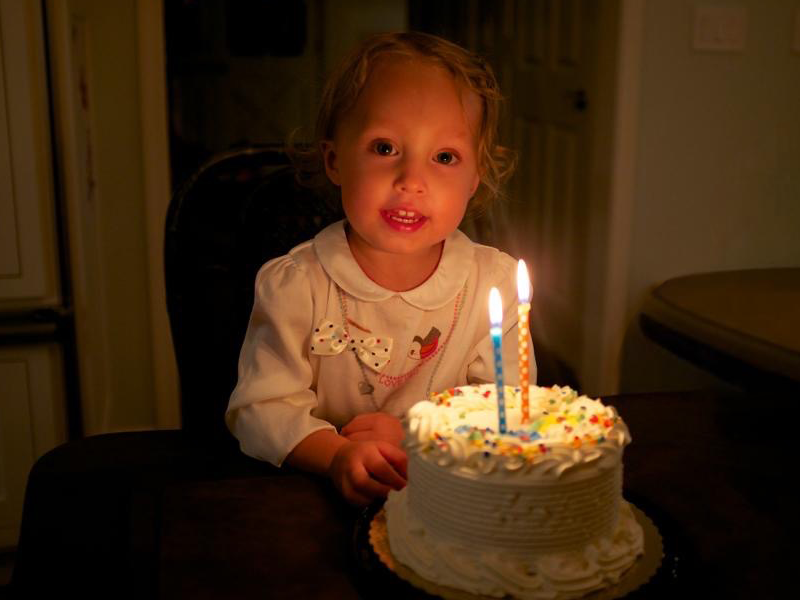
The past year and a half has brought about so many feelings in all of us. A great deal of our fears during the pandemic come from the feeling of uncertainty. Those who like to be in control and know the outcome of every situation have struggled mightily with Covid, exactly because we can’t. These are the types of valuable life-skills we need more than ever today: being comfortable with the uncertainty of an outcome. As much as we have learned about pandemics, no one is certain of the outcome. How are we helping to prepare our children to be okay not knowing?
The Absorbent Mind
The mind of a child is like a sponge, absorbing everything around it. From Dr. Maria Montessori’s observations of children during her work in the first half of the 20th century, she learned that what exists in the environment of each child becomes part of them. In Education for a New World, Dr. Montessori writes, “These impressions not only penetrate the mind of the child, they form it; they become incarnated, for the child makes his own ‘mental flesh’ in using the things that are in his environment. We have called this type of mind the ‘absorbent mind,’ and it is difficult for us to conceive the magnitude of its powers.”
In the first plane of development (birth – age 6), this absorbent mind takes in the language, sounds, smells, sights, tastes, and feelings that surround the child at home and, in fact, everywhere they go. That’s the reason we structure and prepare the environments so precisely at Forest Bluff School. Your home is your child’s first environment, and once they begin school, their classroom is their next one—we consider it a microcosm of society. And little by little, as they move up to the Elementary and Secondary Levels, their world expands. So our job is to prepare your children for the time when they will enter society in all its fullness.
Order and Comfort
Because of the enormity of young children’s powers with that absorbent mind, we must be ever so careful to give the child only what he or she needs. In your child’s classroom at Forest Bluff, your children are provided with predictable routines and environments, freedoms and responsibilities, respect for individuality, and the joy of being part of a community of children and adults who work together, caring for each other.
At home, you can create and maintain a sense of order. Dr. Montessori wrote, “Order is one of the needs of life which, when it is satisfied, produces real happiness.” So, stick to your routines, waking up at the same time each day, having your children make their own lunches, reading before bedtime. The comfort children derive from the stability and consistency in their day helps them feel secure and safe. Your children will know what to expect, and they will know that you are there and that you love them. This will provide them with a sense of joy, as well.
The warmth and affection provided by you to your children positively alter neural circuitry in the brain, which influences their health throughout their lives. This can protect them against the harmful effects of childhood stress. One clear way for our children to feel our affection for them is by reading to them each night before bed. The nurturing that comes from the physical warmth and closeness of cuddling in bed, along with the sharing of a favorite book, will provide strong memories for them later in life, so much so that that feeling of security will be part of their inner being.
As parents and as educators, we need to be our very best for our children. We must focus on the positive things in our lives. Any stress that we ourselves are experiencing in our daily lives will be observed, absorbed, and acted out by our children. In our Montessori training, there is an entire lecture on preparing ourselves as teachers of these children—In The Discovery of the Child, Dr. Montessori writes, “[the teacher] must acquire a moral alertness… that is revealed in her tranquility, patience, charity, and humility. Not words, but virtues, are her main qualifications.”
The Reasoning Mind of the Older Child
As our children become older, we can talk to them a little more about our worries and our concerns. In the second plane of development (ages 6-12), they have a reasoning mind, so they understand the issues facing society. But even our Elementary children—who could understand why we needed to wear masks and socially distance from each other last year—were still anxious about the measures we needed to take in the classrooms. And our oldest students in the Secondary Level discussed and debated the merits of quarantining before their trips dogsledding in Minnesota and canoeing in northern Wisconsin. Children in early adolescence can understand and handle more complex and divisive issues, such as mandating vaccination, but they are not yet fully their own person. Until the age of 24, human beings are still developing, sorting through who they are, what they believe, and how they plan to live their lives.
Developing a Practice of Gratitude
One of the most effective ways to develop optimism is to practice gratitude. When we are thinking about what we are grateful for in our lives, it makes it harder to be pulled into the anxiety vortex. It’s important that we do everything we can to stay positive in our own mental attitude. Try to remind yourself of the beauty all around us.
Gratitude is the antidote to taking things for granted. Oftentimes, we forget too easily the gifts that we have been given. We forget that life is impermanent. If it doesn’t come naturally, we must remind ourselves to be grateful for all we have. Once we received the stay-at-home order last year, we very swiftly went into our own lockdowns. It wasn’t until then that we realized how much we missed seeing others face-to-face, feeling their touch, giving hugs to our friends or our grandparents. It wasn’t until we lost those pleasures, that we realized what we had pre-pandemic. We were able to enjoy much of that again this summer, but let us not forget how meaningful and vital those small things are once we come out of this challenging time. Let’s share with our children the gifts of affection and love that they need and desire. Don’t allow fear to rule your thoughts and actions.

Nature as an Antidote
Richard Louv’s book, Last Child in the Woods, talks about what he calls a nature-deficit disorder, outlining the problems that come from us not spending enough time outdoors. He writes that direct exposure to nature is essential to healthy physical and emotional development, both for children and adults. Lake Bluff and Lake Forest provide so many opportunities to walk and bike around town, or hike through a nature preserve, or play at the beach. Continue to make these outings a priority. Nature is healing. Not only does it bring us a sense of peace and calm, but it reminds us of the great big world in which we live and our part in it. The beauty of nature reminds us that there is a spirituality that we and our children are longing for. We need to be reminded that we are only a small part of the mighty universe.
Just go outside and be present. Have fun! We are all happier when we’ve been outside. Take a positive approach to everything you do with your children. There are lots of good ideas in the book Let’s Go Outside! by Jennifer Ward. Here are some I have gathered over the years:
- Hunt through the ravine to find different types of leaves, then take them home and make a collage out of them, or for the older children, have them look them up, label them, and categorize them according to their shape.
- Lie on your backs and watch the clouds float by, guessing what each one’s shape looks like.
- Build a terrarium together, collecting plants, gravel, soil, and moss in a glass container
- Plant spring bulbs in the fall and watch for them the following year. Children can draw what they think they will look like when they bloom, and then compare the live specimens.
- Have your older children use your phone to take photos of frozen berries and branches, coated in ice. Then they can make a collage or print them out and frame them.
Your children want to do what you’re doing. It may be messier and take more time, but it will be worth it for both you and them. They just want time with you, so be fully present with them.
Intentional Conversations
It’s so important that we don’t project our fears and anxieties onto our children. You may be sad about wearing a mask again this year, but your children are very adaptable and don’t mind it as much as you may think. I have observed in the classrooms daily since school began, and what I have seen is wondrous. The children are engaged, focused, concentrating. They aren’t talking about or complaining about wearing a mask. We project our fears and anxieties onto our children without even realizing we’re doing it. Already on the first day of school, they were joyful to be here again. Without even being aware, they had been craving the beauty of these Montessori materials and the feeling of satisfaction that comes from working with them.
In addition, try not to talk about your own worries in front of your children. Dan Baker, a psychologist and author, says, “We do not describe the world we see, we see the world we describe.” So we need to be careful how we describe the world to our children, so that rather than developing a sense of doom and helplessness, they have optimism about the future in which they will take part.
If they ask, explain to your three-year-old why we wear a mask at school, calmly saying, “We’re helping others by wearing a mask, so that we all try to keep each other healthy.” Instead of allowing them to hear about the Delta variant because the news is on and unfiltered, focus on the good things in your lives and take on an attitude of “We’ll get through this together!” With courage, you and your children feel empowered to take on each new day, each new challenge. They are not overwhelmed by the statistics and data, and we need not be either. Let them know that humans are amazingly adaptable, and that with their gifts of intellect and will, spirit and curiosity, we have as a species accomplished incredible things. Reassure your older children that this is not the first time the world has experienced a pandemic. If we model courage and optimism ourselves, our children will pick that up and understand that they, too, have the abilities and gifts to overcome any challenge that comes their way. In doing this, not only will you aid in their healthy emotional development, but you will be happier yourself.
When issues of political or social unrest come up in your family and you have children who are older, listen, acknowledge their feelings, and then talk about those in history who have stood out for their leadership and courage. When you express gratitude for others’ accomplishments and kindness, your children are then better able to approach, with respect and understanding, the differences they encounter in others and in the world. Don’t instill divisiveness in their language by only talking about issues around which people don’t agree. Instead, talk about ways to peacefully accept and respect those with different views and opinions than their own. These interactions happen daily in the classroom and outside of it, and the children are shown ways and given language to express their feelings with kindness.
Mindful Meditation
Another way to provide peace in your homes is to do some form of mindfulness meditation, a practice of self-awareness in body and mind. Our lives today leave almost no “down time”—no time for stillness, boredom, or relaxation. That’s why at Forest Bluff, we always recommend that you not overschedule your children’s afternoons and weekends. We all need this time, and after a full day in a Montessori classroom, children have lots to process and work through—all the activities they did, all the social interactions they had. They need time every day to relax their bodies and calm their nervous systems. Meditation can help with this. This helps relax their bodies and settle their minds, providing emotional balance and resilience in dealing with difficult situations. Dianne Maroney, founder of the Imagine Project, writes that, “Mindfulness creates resilience because it promotes an understanding of one’s emotions, the ability to control emotions, and a deeper sense of knowing what we are fully capable of.”

Service for Perspective
Serving those in need allows us to open our perspective on the world. This begins in the classroom, where each child cares for the environment—watering the plants, washing the dishes, dusting the shelves. They learn that their contribution to the class is important, so do the same at home. Help them to realize that their contributions to your family and home are also vital—that your children are a needed and wanted part of your family. Then, as they get older, this will translate to their realization that this care extends to those outside their own community. In the Secondary Level, the children continue this service to others by working to build canoe racks, an amphitheater, and an archery shed at a camp, to be used by others they will not meet. Here are a few ideas of ways your children can serve the larger society in which they live, while having to stay within the safety of their own homes during the pandemic:
As a family, packing “blessing bags” with supplies those experiencing homelessness need when living on the streets, is a wonderful way to give to others who are less fortunate. Our family made some last year, filling a gallon-size Ziploc bag with things like granola bars, hand warmers, bottles of water, needed hygiene items, and a list of shelters and local organizations that could help them. We kept the bags in our car, and when we traveled into the city and stopped at a traffic light, guess how thrilled the person was to get one of these? One man said, “Oh, I lovethese!”
Anytime we can get outside ourselves—our own concerns and agendas—we gain a different perspective. We forget about our problems and are able to see that, often, they pale in comparison to others’. Children need to see these things as they get older, and at the elementary and secondary levels, they are well able to use their sense of compassion to help others outside their immediate environments. Often, nonprofit organizations don’t accept volunteers under the age of sixteen, so be creative! Make bookmarks for the elderly and drop them off at a retirement community. Shop for your local food pantry with your children, dropping the needed items off at the store or church collection points. Make homemade valentines to share with elderly neighbors.
Cultivate Hope
Finally, one of the virtues I dearly espouse is hope. Without it, we would be living in a place of darkness. When we have something to look forward to, things always seem rosier. Research shows that anticipation of something can be more enjoyable than the thing itself. During the pandemic, we have had to cancel plans and forgo vacations and time with family and friends, so it’s been difficult to place our hope in anything specific. I think of hope as the belief that things will improve. This is not a superficial cheerfulness, but the faith I have that this pandemic will end. We can’t know when or how things may be different on the other side, but we have the strength to endure the losses and hardships until that time; and then when it comes, we can hold onto the gratitude long after our circumstances change. If we make that paradigm shift in our thinking, our children will sense it and come out of this time of darkness knowing there will always be light to see us through.
References and Resources
Baker, Dan. What Happy People Know. USA: Rodale, 2003.
Louv, Richard. Last Child in the Woods. New York: Workman Publishing, 2008.
Maroney, Dianne. “Using Mindfulness during Stressful Times.” Accessed September 8, 2021. https://theimagineproject.org/using-mindfulness-during-stressful-times/.
Montessori, Maria. Education for a New World. Amsterdam: Montessori-Pierson Publishing Company, 2018.
Montessori, Maria. The Discovery of the Child. Translated by M. Joseph Costelloe. New York: Ballantine Books, 1967.
Ward, Jennifer. Let’s Go Outside! Boston: Trumpeter Books, 2009.


